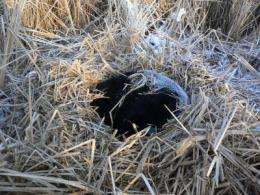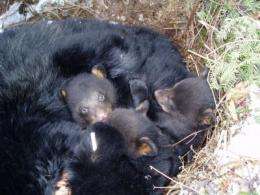Fast asleep to wide awake -- hibernating bears, predation and pregnancy

Black bears hibernate, sleeping their way through winter, and who can blame them? But science is only just beginning to understand the physiological changes that allow bears to re-emerge in spring without much muscle and bone loss, and how they escape from danger during the colder months. New research published in BioMed Central's open access journal BMC Physiology used cardiac monitors and radio collars to measure the year round changes in heart rate and activity of wild black bears.
Previous studies have shown that during hibernation black bears undergo extreme variations in heart rate (respiratory sinus arrhythmia) - the bear's heart rate increases when it takes a breath but stops for extended periods between breaths. In this study the researchers were able to monitor wild American black bears (Ursus americanus) throughout the year, 24 hours a day. They found that the bears had a pronounced respiratory sinus arrhythmia during hibernation and in the months leading up to their winter sleep. In addition, the bears were less active during the day in autumn, switching to being nocturnal. During the summer months, bears were active for up to 18 hours per day and had peak heart rates of over 200 beats per minute, however, during hibernation, respiration rates were as low as two breaths per minute and gaps of over 14 seconds without a heartbeat were recorded.
Pregnant wild bears hibernated deeply at the beginning of winter but their heart rates increased as their pregnancy continued, spiking during birth. After the cubs were born their mother's heart rate returned to hibernation levels. For several weeks after giving birth the mothers also exhibited much less movement, preventing accidental damage to the suckling cubs.

Dr Timothy Laske, one of the team who performed the research said, "When we retrieved our data, even though we tried to be as quiet as possible, the bears' heart rates increased before we reached the entrance to their winter den and remained elevated for a number of days. This confirms that despite apparent deep sleep, bears are always alert to danger and ready to act."
Dr David Garshelis who collaborated on this project continued, "Using this technology, year-round monitoring of wild bears allows us to observe details of bear behavior, such as pregnancy and birth, or interactions between bears and other wild animals, without disturbing their natural behavior." Dr Laske added, "Black bears often make their way into suburban areas which can be dangerous and stressful for both bears and humans and understanding the silent effect of humans and the environment on bears will also allow better bear management."
More information: Monitoring the wild black bear's reaction to human and environmental stressors, Timothy G Laske, David L Garshelis and Paul A Iaizzo, BMC Physiology (in press)
Provided by BioMed Central

















